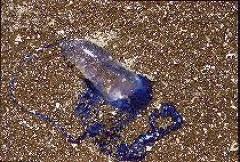First Aid for PORTUGUESE MAN OF WAR STINGS

For the average Hawaii Portuguese man-of-war sting:
- Pick off any visible tentacles with a gloved hand, stick, or anything handy, being careful to avoid further injury.
- Rinse the sting thoroughly with salt or fresh water to remove any adhering tentacles.
- Apply ice for pain control.
- Irrigate exposed eyes with copious amounts of room temperature tap water for at least 15 minutes. If vision blurs, or the eyes continue to tear, hurt, swell, or are light sensitive after irrigating, see a doctor.
- For persistent itching or skin rash, try 1 percent hydrocortisone ointment four times a day, and one or two 25 milligram diphenhydramine (Benadryl) tablets every 6 hours. These drugs are sold without prescription. Diphenhydramine may cause drowsiness. Don't drive, swim or surf after taking this medication.
Although formerly considered effective, vinegar is no longer recommended for Portuguese man-of-war stings. In a laboratory experiment, vinegar dousing caused discharge of nematocysts from the larger (P. physalis) man-of-war species. The effect of vinegar on the nematocysts of the smaller species (which has less severe stings) is mixed: vinegar inhibited some, discharged others.
No studies support applying heat to Portuguese man-of-war stings. Studies on the effectiveness of meat tenderizer, baking soda, papain, or commercial sprays (containing aluminum sulfate and detergents) on nematocyst stings have been contradictory. It's possible these substances cause further damage. In one U.S. Portuguese man-of-war fatality, lifeguards sprayed papain solution immediately on the victim's sting. Within minutes, the woman was comatose, and later died.
Alcohol and human urine may be harmful on Portuguese man-of-war stings. An Australian study reports that both alcohol and urine caused massive nematocyst discharge in the box jellyfish, Chironex fleckeri.
Most Hawaii Portuguese man-of-war stings disappear by themselves, sometimes within 15 or 20 minutes. Because of this, even harmful therapies often appear to work. A key concept in the first aid of any injury is: Do no harm. Therefore, avoid applying unproven, possibly harmful substances on stings.
See a doctor if pain persists, the rash worsens, a feeling of overall illness develops, a red streak develops between swollen lymph nodes and the sting, or if either area becomes red, warm and tender. (See Staph, Strep and General Wound Care for signs of infection.)
Few Portuguese man-of-war stings in Hawaii cause life-threatening reactions, but this is always a possibility. Some people are extremely sensitive to the venom; a few have allergic reactions. Consider even the slightest breathing difficulty, or altered level of consciousness, a medical emergency. Call for help and use automatic epinephrine injector if available.
